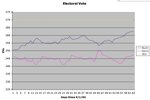November 07, 2004
Electoral Analysis In Hindsight
I have a depressing analysis to share. I've done a new study on the 2004 polls, and it shows that we were fighting an uphill battle the entire campaign, and that the odds were against us winning all along.
The reason I'm sharing it is because I think it's highly valuable in illustrating just how much work we need to do in order to become competitive again as Democrats.
This builds upon earlier work that I have done. A few months ago, I went back and analyzed the 2000 vote and showed that Bush actually had more electoral support than Gore.
A few days ago I showed that even if we were able to steal the 150,000 votes to win Ohio, Bush still had more electoral support in 2004.
The way I did this is that I checked each state's results and awarded each candidate a portion of that state's electoral votes, by what percentage the candidate got in that state. That's why Gore winning Florida, or Kerry winning Ohio doesn't make much of a difference in the analysis, because what matters in proportions is the margin between the two candidates.
This approach has proven to be somewhat, uh, controversial. I know that almost all states are winner take all in reality. My point is that since almost all of the states are winner take all, they pretty much cancel each other out, and approach the same numbers that this approach does, for close elections. Most people think I'm choosing an arbitrary technique, but it's not.
What this does is it shows the real electoral support that each candidate has in terms of the Electoral College, if the electoral college happened to lay out completely fairly. I take each candidate's percentage in the state, and multiply it by that state's Electoral Votes, and then I add them all up. For instance, this year Kerry gets 9.7 EVs in Ohio, and Bush gets 10.2. A candidate can outperform these numbers by winning more close states than the other candidate, but the point is that you can't rely on winning more close states. Close states can go either way and it's pretty much random who gets them.
If a candidate has lower numbers in the proportional E.C. count, then it means that they have to win more close states than the other candidate in order to win, which means the odds are against them.
So here's the study I just completed. I looked at the last sixty days worth of polls for each state, awarded electoral votes proportionally, and added them up. Each day comprises all the polls that were asking questions of voters that day, average multiple polls per state if necessary. This is an illustration of how much real electoral support each candidate had since September 1st. Here's the graph:
(click for larger version.)
And there you have it. While both are under 270 because of undecided voters, Bush all along had the very clear advantage. Bush needed to win less close states in order to win the election.
And, that's exactly what happened. Kerry outperformed Bush, as Gore did in 2000 (even without Florida). Of the ten closest states this year, Kerry won six, for 69 EVs. Bush won four, for 37 EVs. And, Bush still won.
Bush clearly had more electoral support than Kerry. The only way Kerry could have won was by being extremely, extremely lucky - beyond just not making mistakes.
I wish I had thought of this before the election... if I had gotten it out there enough, it might have shown people how much more work we had to do. At least in the blog activism world, we were really overconfident in the last two weeks, and this could have put a stop to it.
